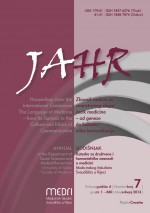Sociomedical interaction in English: towards virtual hospital
Keywords:
Computer platform/template, extuality, eacher-learner interactions, Medico-social contexts, CDA (Critical Discourse analysis), Medical EnglishAbstract
In the study of Medical English, encouraging medical undergraduates to reflect on the medi-cal content of texts and genres proposed and sometimes imposed by society, as relevant to health and healthcare is an indispensable component for online student-teacher interactions. In keeping with the principles underlying CDA (critical discourse analysis), linkages and comparisons between texts belonging to different genres are explored in relation to set of thematically-related texts relating to health aspects of water and foodstuffs. The paper presents a three-tier model for the qualitative analysis of individual texts and describes their typical make-up in terms of three broad categories of social contexts: individual, community and international/institutional levels. The model of analysis lends itself to quantitative, as well as qualitative, analysis of the ratio between medical and non-medical information in health texts, leading to the prospect of automatic on-line quantification in a computer template/platform that can guide teacher-learner interactions and comparisons of texts, thus ensuring that understanding of the forms and functions of today’s complex hybrid healthcare texts is kept on a sure footing. Hence, thanks also to the efforts of the classroom teacher, the future global doctor will be empowered to shape his or her own ethical code in way which is likely to be more objective and balanced.
Downloads
Published
Issue
Section
License
Authors who publish with this journal agree to the following terms:
- Authors retain copyright and grant the journal right of first publication with the work simultaneously licensed under a Creative Commons Attribution License that allows others to share the work with an acknowledgement of the work's authorship and initial publication in this journal.
- Authors are able to enter into separate, additional contractual arrangements for the non-exclusive distribution of the journal's published version of the work (e.g., post it to an institutional repository or publish it in a book), with an acknowledgement of its initial publication in this journal.
- Authors are permitted and encouraged to post their work online (e.g., in institutional repositories or on their website) prior to and during the submission process, as it can lead to productive exchanges, as well as earlier and greater citation of published work (See The Effect of Open Access).



